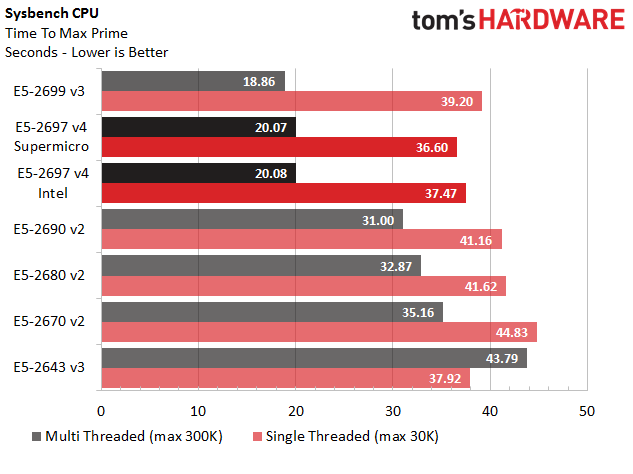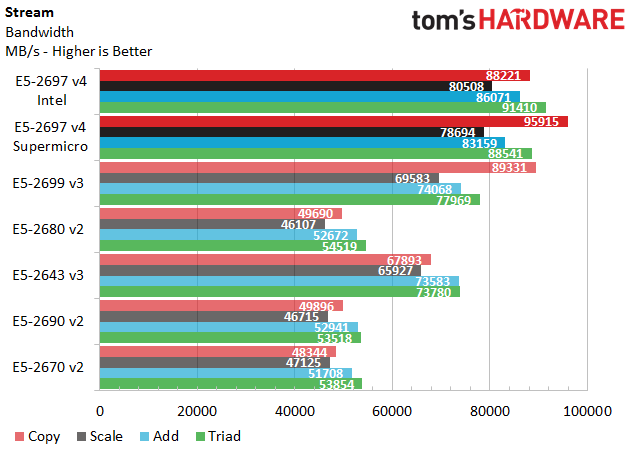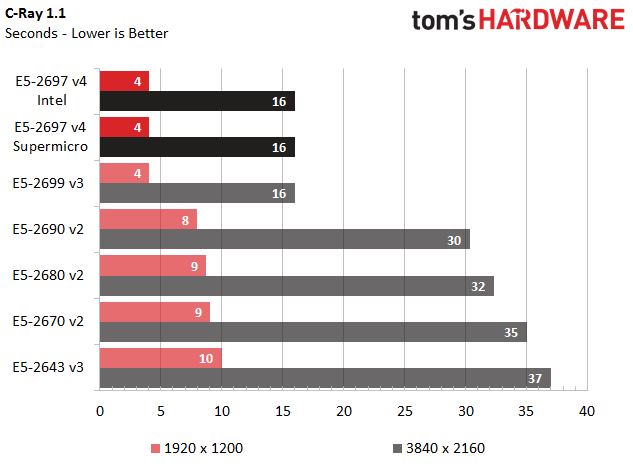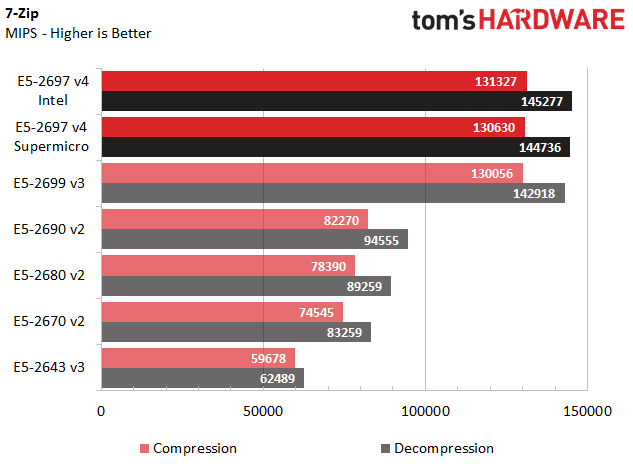Intel Xeon E5-2600 v4 Broadwell-EP Review
Why you can trust Tom's Hardware
Additional Benchmarks
Sysbench CPU
Sysbench is a widely used suite that characterizes CPU, memory, file I/O, mutex performance and MySQL performance. We focus on the CPU test, which measures the amount of time required to verify prime numbers in both single- and multi-threaded workloads.
Both Xeon E5-2697 v4-powered servers provide impressive performance, beating most of the competition in the threaded component of this test. But Intel's -2699 v3 spoils the party by reporting a slightly faster result. The v4s fire back, overtaking the Xeon E5-2699 v3 in single-threaded performance, even besting the E5-2643 v3 as well.
Stream
Stream is a relatively simple test developed by Dr. John D. McCalpin. It measures the sustainable memory throughput of a given system in MB/s.
The Intel validation server employs speedy SK hynix DDR4-2400. As such, it leads our bandwidth results. The Xeon E5-2699 v3 employs dual memory controllers, which apparently are not as efficient as what Broadwell-EP brings to bear. They trail, even though they are tested on the same Intel motherboard.
We also tested the Xeon E5-2643 v3 on this board, and it trails significantly. The eight-core die only employs one memory controller, which just can't keep up.
C-Ray 1.1
C-Ray is a raytracing benchmark designed to reside entirely inside of the CPU caches, thus eliminating RAM and disk I/O overhead during the measurement window. The test focuses purely on floating-point performance during rendering and runs on multiple threads.
The -2697 v4s and -2699 v3 are locked in a three-way tie for the lead, while the second-generation E5s fall to the rear. Because this test scales well across multiple threads, the eight-core Xeon E5-2643 v3 is quickly outclassed, despite high clock rates.
Get Tom's Hardware's best news and in-depth reviews, straight to your inbox.
7-Zip
7-Zip is open source software that measures compression and decompression performance, which can be a key capability for storage and networking applications.
The only surprise during this test is just how well the 18-core v4s fare compared to the Xeon E5-2699 v3. Meanwhile, all of the second-gen E5s we tested fare dismally, illustrating the benefits of a more modern platform. Most enterprises will be upgrading from Sandy/Ivy Bridge to Broadwell, and this benchmark does a good job of highlighting the type of performance boost to expect.
HardInfo
HardInfo provides granular system information, and includes a suite of six benchmarks that measure CPU performance. It's easily accessible and comes as a standard component in many Ubuntu desktop systems. We include these tests because they allow our Linux brethren to easily run comparative benchmarks.
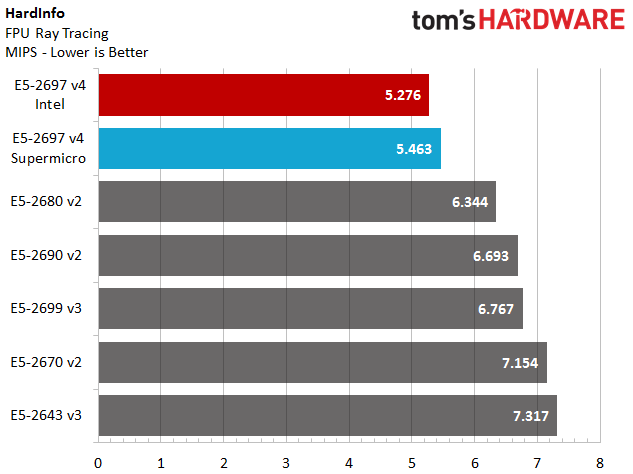
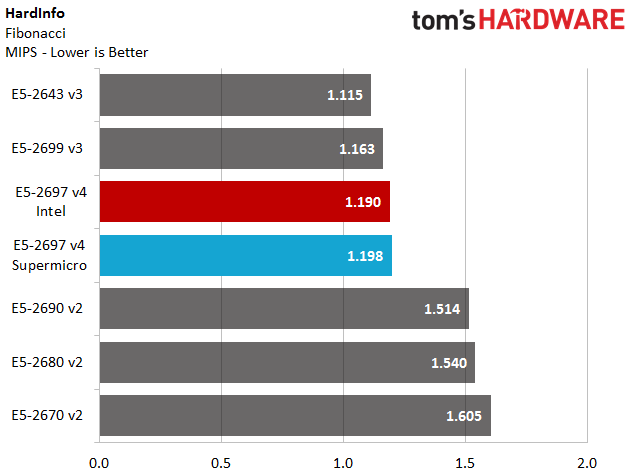
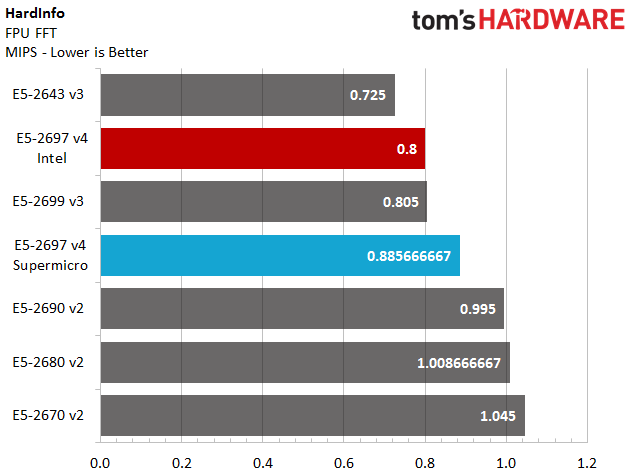
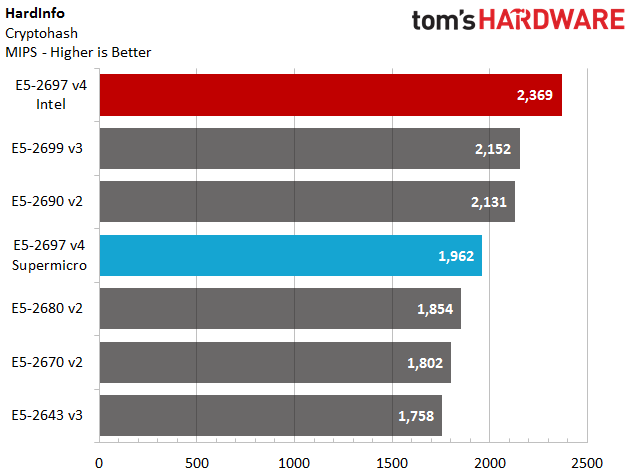
The v4s lead in FPU raytracing, but fall behind their predecessors in the Fibonacci test. This generational face-off gets a little more heated during the FPU FTT tests, and the Xeon E5-2687 v4 in Intel's development platform dominates the Cryptohash test.

Paul Alcorn is the Editor-in-Chief for Tom's Hardware US. He also writes news and reviews on CPUs, storage, and enterprise hardware.
-
utroz Hmm well we know that Broadwell-E chips must be coming very very soon if Intel let this info out.Reply -
bit_user Wasn't there supposed to be a 4-core 5.0 GHz SKU? Single-thread performance still matters, in many cases.Reply
-
turkey3_scratch Reply17746082 said:Wasn't there supposed to be a 4-core 5.0 GHz SKU? Single-thread performance still matters, in many cases.
In most server applications it doesn't matter as much as multithreaded performance. If you need single-core strength, getting a consumer chip is actually better, but you probably aren't running a server if single-threaded is your focus. -
PaulyAlcorn ReplyWasn't there supposed to be a 4-core 5.0 GHz SKU? Single-thread performance still matters, in many cases.
I read the rumors on that as well, but nothing official has surfaced as of yet to my knowledge. -
bit_user Reply
Try telling that to high-frequency traders. I'm sure they want the reliability features of Xeons (ECC, for example), but the highest clock speed available.17746141 said:17746082 said:Wasn't there supposed to be a 4-core 5.0 GHz SKU? Single-thread performance still matters, in many cases.
In most server applications it doesn't matter as much as multithreaded performance. If you need single-core strength, getting a consumer chip is actually better, but you probably aren't running a server if single-threaded is your focus.
And the fact that Intel even released low-core high-clock SKUs is an acknowledgement of this continuing need. Clock just not as high as I'd read. With the other specs basically matching the Haswell version, the only difference is ~5% IPC improvement. Seems pretty poor improvement, for a die-shrink.
-
firefoxx04 Would nice to have a quad core xeon that turbos at 4.4ghz just like the 4790k. I had to go with a 4690k when building an autocad system because it only uses one core and needs that core to be fast... this means i have to sacrifice ecc support.Reply -
bit_user Reply
On wccftech (not the most reliable source, I know), they claimed:17746160 said:Wasn't there supposed to be a 4-core 5.0 GHz SKU? Single-thread performance still matters, in many cases.
I read the rumors on that as well, but nothing official has surfaced as of yet to my knowledge.
Model: Intel Xeon E5-2602 V4
Cores/threads: 4/8
Base clock: 5.1 GHz
Turbo clock: TBD
L3 Cache: 5 MB
TDP: 165W
Given what we know about 2.5 MB/core of L3 Cache, the 5 MB figure sounds suspicious. It's conceivable they could disable some to hit the target TDP, I guess.
-
firefoxx04 We cant get skylake to consistently hit 5ghz... why would a xeon chip suddenly hit 5ghz?Reply -
JamesSneed Reply17746312 said:We cant get skylake to consistently hit 5ghz... why would a xeon chip suddenly hit 5ghz?
I'm not saying the 5Ghz rumor is true but Intel has always known which chips can hit higher clocks during certification if the chip is a top end or low end chip cores disabled etc. I'm sure they could cherry pick a few to sell for $$$ if they wanted. Now are they I have no real idea. -
bit_user Reply
Well, I was surprised, too.17746312 said:We cant get skylake to consistently hit 5ghz... why would a xeon chip suddenly hit 5ghz?
There are obviously things you can do in chip design that allow one to reach different timing targets. And I was hoping they might've refined their 14 nm process, since the time the first Broadwells launched. So, I thought, with more TDP headroom afforded by this socket (roughly double what Skylake has to work with), maybe they could do it.
I thought maybe Intel was addressing some pent-up demand for high clockspeed applications. That said, it seemed particularly odd in Broadwell, given that it generally seems oriented towards lower clockspeed / lower power applications.
But maybe it was a typo, or even a blatant lie, in order to track down leakers.
